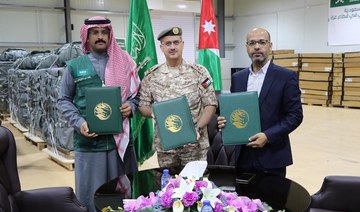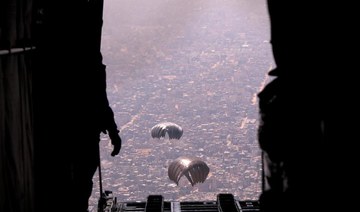ALEXANDRIA: Yemenis from all walks of life have hailed the UN blacklisting of Iran-backed Houthis for killing children in the war-torn country and renewed calls for tougher measures against the rebels, including designation as a terrorist organization.
Yemeni politicians, human rights activists and journalists who have long advocated shaming and naming the Houthis for abusing children praised the UN boycott and called on individual countries to follow suit.
“The grave violations committed by the Houthi militia against civilians in the past six years amount to war crimes against humanity, mainly against children,” Mohammed Ahmed Al-Omda, director of Yemen Human Rights and Freedoms Network, a Yemeni NGO that documents Houthi human rights abuses, told Arab News on Monday.
“This designation is the only weapon that can pressure the Houthis to stop crimes and violations against Yemeni children,” he said.
Fuad Al-Mansouri, head of Development Media, called for the Houthis to be designated a terrorist organization for threatening regional and international security.
“The Houthi militia is a terrorist group according to different definitions of terrorism. It targets civilian gatherings in Yemen and Saudi Arabia, and threatens international shipping lines,” Al-Mansouri told Arab News.
On Friday, UN Secretary-General Antonio Guterres added the Houthis to a UN blacklist for killing and injuring children.
The Yemeni rebels have been included in the UN Secretary-General Report on Children and Armed Conflict for abusing and recruiting children since 2016.
Yemenis have launched a social media campaign to thank the UN for blacklisting the Houthis and also remind the international community about Houthi crimes against children.
Sharing graphic images of wounded or dead children, dozens of Yemeni activists, journalists, politicians and individuals said that the militia is responsible for killing and wounding thousands of Yemeni children and forcibly recruiting thousands more.
Abdul Basit Al-Baher, Yemeni army spokesperson in Taiz, said that the intensive rebel shelling of residential areas in the country kills young Yemenis at the same time as the militia “brainwash the minds of Yemeni children.”
“The Houthis physically are killing Yemeni children with weapons, but are also harming them mentally by raising an extremist generation on grudges and hatred,” the military official said in a twitter post.
Eyad Al-Sharabe, a Yemeni journalist and human rights activist, said that the Houthi abuse children under their control by brainwashing them. Children are then trained and sent to the battlefield. Meanwhile, children who live in government-controlled areas have their houses and schools targeted by missiles, mortars rounds and explosive-rigged drones.
“Children are not spared. They are pushed to the incinerators of death, and bombed in areas outside the Houthis’ control,” the activist said.
Sharing images of children gunned down by the Houthis, the Yemeni activists said that in August 2020, a militia sniper killed eight-year-old Ruwaida Saleh while she was collecting water in the city of Taiz, and fired at people who rushed to rescue her.
Other Yemeni activists posted images of Lian, the five-year-old who was burnt to death in a deadly Houthi strike in the central city of Marib on June 6.
This designation is the only weapon that can pressure the Houthis to stop crimes and violations against Yemeni children.
Mohammed Ahmed Al-Omda
“Whoever talks about Houthi humanity is inhuman. What do the criminal Houthi want from childhood?” asked Walid Al-Rajhy, director of the Marib-based Saba Media Center, on Twitter.
Human rights groups have monitored Houthi abuses of children along with the deaths, maiming and forced recruitment of thousands of Yemeni children since early 2015.
Yemen Human Rights and Freedoms Network has documented 20,977 abuses by the Houthis against Yemeni children as the rebels’ repression and military operations displaced 43,000 more children from January, 2017 to March, 2021.
Violations include killing, abduction, forced displacement, and depriving children of education and medical treatment. During those four years, the militia killed 343 children, including 31 infants.
Houthi mortar fire killed 287 children and land mines killed 136 others, according to the organization.
The organization said that 1,716 children have been killed while fighting with the Houthis.
Nadwa Al-Dawsari, a Yemeni conflict analyst, said that the blacklisting of the Houthis is welcomed by Yemenis who view the move as international recognition of rebel crimes.
“Child recruitment, mass indoctrination, and the laying of land mines that killed and maimed thousands, mostly children, are only a few ways that the Houthis systematically abuse children, destroying the future of generations to come,” the analyst said.




























